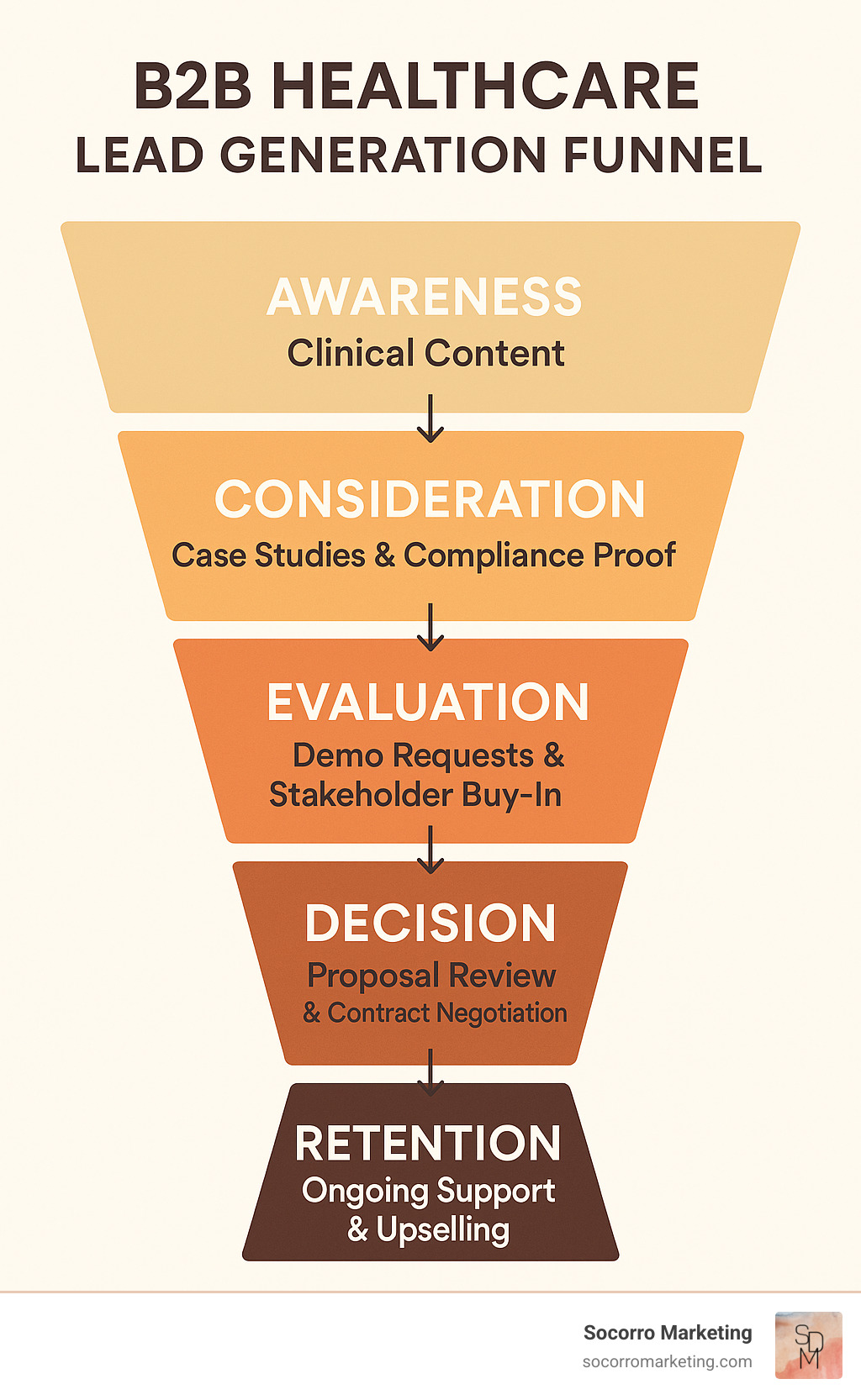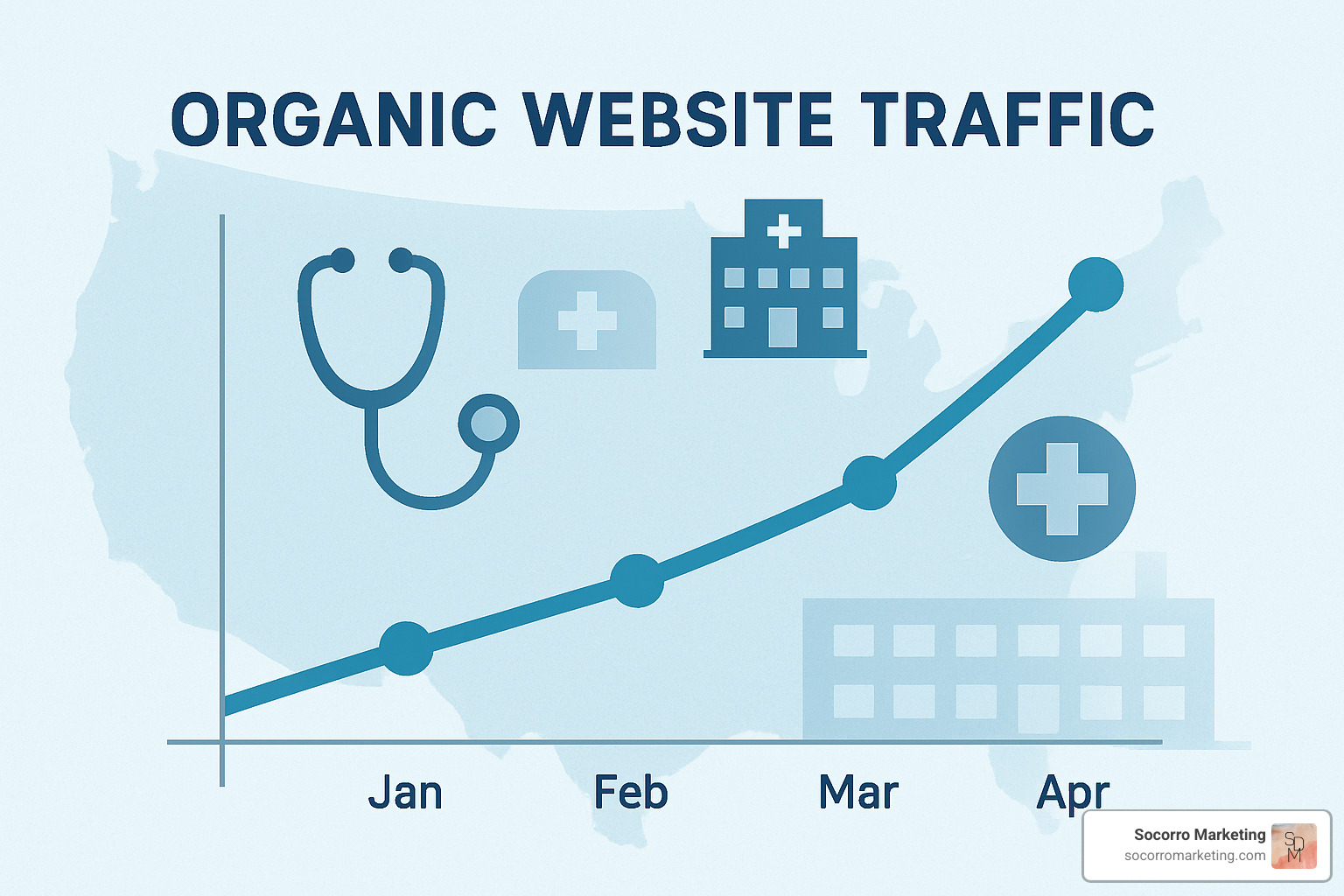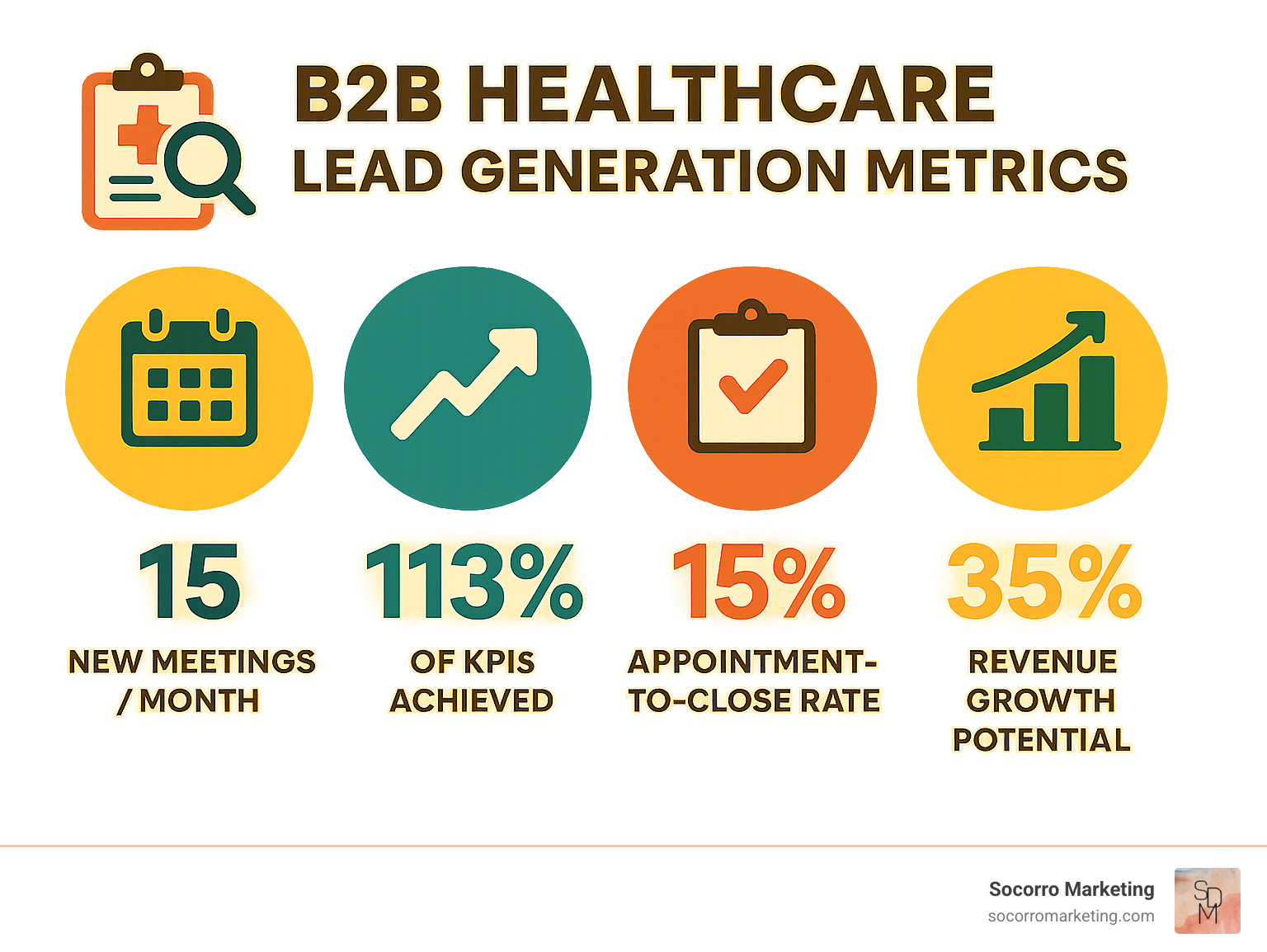A b2b healthcare lead generation agency specializes in generating qualified sales opportunities for companies selling to hospitals, medical practices, and healthcare organizations. These agencies understand the unique challenges of healthcare sales cycles, regulatory compliance, and the clinical decision-making process.
Top B2B Healthcare Lead Generation Services:
The healthcare B2B market presents unique obstacles that generic marketing agencies simply can't steer. Healthcare decision-makers are risk-averse, buying processes involve multiple stakeholders, and trust is earned through clinical credibility rather than flashy marketing tactics.
Research shows that B2B healthcare companies working with specialized lead generation agencies achieve an average of 15 new meetings booked every month and 113% of campaign KPIs. The average cost for an organic healthcare lead is $320, while paid campaigns can cost up to $400 per lead - making expertise crucial for ROI.
I'm Grace Ascione, a registered nurse with an MBA who has worked in both clinical settings and healthcare marketing for over 15 years. My experience helping healthcare businesses optimize their digital presence and work with b2b healthcare lead generation agency partners gives me unique insight into what actually drives results in this specialized market.

When you're selling to hospitals, medical practices, or healthcare organizations, you're reaching out to Chief Medical Officers juggling patient care and budget meetings, IT directors worried about system crashes affecting patient safety, and purchasing managers who know that one wrong decision could impact lives.
These healthcare decision-makers face unique challenges. They're drowning in vendor pitches while trying to focus on patient outcomes. They're dealing with tight budgets, complex regulations, and constant pressure to improve care quality. A b2b healthcare lead generation agency understands these pain points in ways that generic marketing firms simply can't.
Healthcare buying decisions are never made by just one person. Take a typical hospital software purchase - you might need buy-in from the IT Director (worried about integration), the CFO (focused on ROI), clinical staff (concerned about workflow disruption), and administration (thinking about compliance). Each person speaks a different language and has different priorities.
This is where smart segmentation becomes crucial. A cutting-edge academic medical center operates completely differently than a small rural clinic. Effective agencies develop detailed buyer personas and segmentation strategies that account for these massive differences in healthcare settings.
Multi-channel approaches work best because healthcare professionals consume information in various ways. Some doctors prefer clinical studies and white papers. Others want peer testimonials or conference demonstrations. The most successful agencies orchestrate touchpoints across email, LinkedIn, content marketing, webinars, and medical journals.
Compliance considerations touch everything in healthcare marketing. HIPAA regulations affect how you can reference patient outcomes. FDA rules govern claims about medical devices. Every campaign element needs built-in compliance checks - something most general marketing agencies aren't equipped to handle.
The nurturing process is absolutely critical in healthcare because of those long 6-18 month sales cycles. Healthcare buyers need time to build trust, review clinical evidence, and get everyone on board. This requires sophisticated lead scoring and nurturing workflows that keep prospects engaged without being pushy.
For deeper insights on creating medically-informed messaging that resonates with healthcare audiences, check out our guide on medical content marketing.
Appointment setting remains the backbone of healthcare lead generation, but it requires experienced sales development reps who can steer protective gatekeepers, understand clinical priorities, and speak credibly about complex medical topics. The best healthcare-focused agencies report 15% appointment-to-close rates through human-first outreach.
Account-Based Marketing (ABM) has become essential for targeting high-value healthcare accounts. Instead of casting a wide net, ABM focuses resources on specific target accounts with highly personalized campaigns. This approach works particularly well in healthcare where deal sizes are large and buying committees are complex.
Content marketing in healthcare demands clinical credibility that goes far beyond typical business content. Healthcare audiences expect evidence-based information, peer-reviewed research, and content that demonstrates deep industry knowledge.
Cold calling in healthcare requires a completely different approach than other industries. Healthcare professionals are notoriously difficult to reach and naturally skeptical of vendor calls. The most effective agencies use manual dialing with experienced SDRs who can quickly establish credibility.
HIPAA compliance creates challenges that don't exist in other industries. Any marketing that references patient outcomes or clinical data must comply with strict privacy regulations. One compliance mistake can derail an entire campaign.
Multi-stakeholder decision making is the norm in healthcare purchases. While other industries might have one or two decision-makers, healthcare purchases routinely involve clinical staff, IT departments, finance teams, administration, and sometimes board members.
Risk aversion runs deep in healthcare culture. Medical professionals are trained with "first, do no harm," and this extends to purchasing decisions. They strongly prefer proven solutions with extensive clinical evidence over innovative but unproven technologies.

When you're looking for the right B2B healthcare lead generation agency, you need to understand what services actually move the needle in healthcare sales. The most successful campaigns weave together multiple strategies that work like a well-coordinated care team.
Healthcare buyers are cautious by nature. They need time to build trust, evaluate options, and get buy-in from colleagues. That's why account-based marketing has become so powerful in healthcare - it focuses on building real relationships with specific organizations rather than casting a wide net.
Appointment setting remains the backbone because healthcare professionals value personal connections. Thought leadership content builds the credibility that makes those conversations possible, while demand generation activities keep your brand top-of-mind during long decision cycles.
Different healthcare sectors need specialized approaches. For example, our work in behavioral health digital marketing shows how mental health organizations require completely different messaging than acute care hospitals.
ABM flips traditional lead generation on its head. Instead of trying to attract hundreds of leads, you focus energy on healthcare organizations that are perfect fits for your solution.
The magic starts with creating detailed Ideal Customer Profiles (ICPs). For a medical device company, this might mean targeting 300-bed hospitals in suburban areas with active surgical programs. For healthcare IT vendors, it could be health systems still using legacy electronic health records.
Target list development requires detective work. You need to identify not just the decision-maker, but everyone who influences the buying process. In healthcare, that's often many people - the CMO who cares about clinical outcomes, the CIO worried about system integration, and the CFO watching the budget.
Personalization in healthcare ABM goes beyond using someone's first name. It means understanding specific challenges facing their organization. Maybe they're dealing with nurse staffing shortages, preparing for a Joint Commission survey, or announced a new service line.
| ABM Approach | Inbound Marketing |
|---|---|
| Targets specific high-value accounts | Attracts broad audience |
| Highly personalized messaging | Generic content |
| Account-specific research | Keyword-based content |
| Multi-stakeholder focus | Individual lead focus |
| Long-term relationship building | Transaction-focused |
Data enrichment separates good agencies from great ones. Healthcare organizations are complex, and you need accurate information about their technology, recent changes, and key personnel. The best agencies invest in comprehensive healthcare databases and keep them updated regularly.
Intent data is like having a crystal ball for healthcare buyers. When a health system starts downloading cybersecurity white papers or attending patient engagement webinars, that tells you about their priorities. Smart agencies monitor these buying signals and time their outreach accordingly.
Manual dialing still beats automated systems in healthcare because it allows for real-time adaptation. When the CMO's assistant says "Dr. Smith is in surgery all morning but checks messages around 2 PM," a human can adjust.
Human-first calls work because they focus on building relationships rather than pushing for immediate meetings. The best healthcare SDRs position themselves as industry resources. Healthcare-specialized SDRs typically see 30% higher appointment rates compared to generic business development reps.
Expert articles that demonstrate real clinical knowledge build the trust that healthcare buyers demand. These aren't generic business articles with healthcare examples - they're deep dives into challenges healthcare professionals face daily.
Backlink building in healthcare means earning links from sources that matter to your audience. A link from the American Hospital Association carries more weight than ten links from generic business blogs.
Our guide to SEO strategy and keyword research shows how healthcare SEO requires understanding both clinical terminology and how healthcare professionals actually search for information.

Email deliverability in healthcare faces unique challenges. Many healthcare organizations have strict email security policies that can block marketing messages. Professional agencies use dedicated infrastructure and careful reputation management to ensure message delivery.
HIPAA-safe templates avoid any reference to patient information or protected health data. The focus should be on operational benefits and organizational improvements that don't touch patient-specific information.
LinkedIn outreach has become increasingly valuable as healthcare professionals become more active on professional networks. However, the approach needs to be consultative rather than sales-focused.
Resource gaps are common in healthcare companies that excel at clinical or technical work but lack specialized marketing expertise. Building an in-house healthcare marketing team can take months or years, while a specialized agency provides immediate access to proven systems.
Rapid scaling needs often arise when healthcare companies secure new funding, launch innovative products, or expand into new markets. Agencies can quickly deploy the resources and expertise needed to accelerate growth.
Cost efficiency becomes clear when you compare the total investment in building internal capabilities versus working with specialists. Outsourced SDR services can cost significantly less than expanding an in-house team while providing access to specialized tools and expertise.
Understanding what success looks like is crucial when working with any b2b healthcare lead generation agency. Healthcare campaigns require different metrics than typical B2B marketing because of longer sales cycles and more complex buying decisions.
Sales Qualified Leads (SQLs) represent the gold standard for healthcare lead generation. These aren't just people who downloaded a white paper - they're prospects who have been vetted by your sales team and meet specific criteria like budget authority, implementation timeline, and genuine clinical need.
Customer Acquisition Cost (CAC) naturally runs higher in healthcare than other industries. The good news? Healthcare customers typically have much higher lifetime values, making that investment worthwhile.
Pipeline velocity measures how quickly prospects move from initial contact to closed deals. Healthcare companies working with specialized agencies report 33% shortened sales cycles through better lead qualification and nurturing.
The compliance landscape adds complexity. HIPAA requirements affect how you collect and store prospect data. GDPR rules come into play if you're targeting European healthcare organizations. Understanding these regulations isn't just about avoiding penalties - it's about building trust.
For broader context on how technology is reshaping healthcare marketing, this Forbes article on advanced medical technologies offers valuable industry insights.
Lead volume in healthcare should always be measured by quality over quantity. A dozen highly qualified leads beats a thousand tire-kickers every time. The qualified rate - the percentage of leads that actually meet your sales criteria - is where specialized healthcare agencies really shine. Industry data shows healthcare-focused agencies achieve 7× improvement in lead quality compared to generic approaches.
Appointment-to-close rates typically hover around 15% for healthcare lead generation, though this varies significantly based on your solution type and average deal size. Revenue impact is ultimately what matters most. Leading agencies help healthcare clients achieve 35% year-over-year revenue growth through improved lead generation and sales processes.
The technology behind successful healthcare lead generation is sophisticated. CRM systems need to handle complex organizational structures where a single sale might involve clinical staff, IT departments, finance teams, and administration.
Marketing automation platforms must balance personalization with compliance requirements. They need robust consent management, detailed audit trails, and the ability to immediately honor opt-out requests.
Predictive analytics and AI-powered lead scoring consider factors like engagement history, organizational characteristics, and buying signals to identify which prospects are most likely to convert and when they're ready for sales engagement.
Consent management requires crystal-clear opt-in processes and immediate opt-out capabilities. Healthcare prospects expect transparency about how their information will be used.
Encryption protocols protect prospect data both when it's being transmitted and when it's stored. Even when you're not dealing with actual patient information, treating healthcare prospect data with the highest security standards demonstrates professionalism and builds trust.
Audit trails document every interaction with prospect data - who accessed what information, when changes were made, and what communications were sent. This documentation is essential for compliance audits.
According to BrightLocal's consumer review survey, 73% of patients trust a healthcare brand when they see positive reviews online. This trust factor extends to B2B relationships, where healthcare professionals research vendors thoroughly before engaging.

Choosing the right b2b healthcare lead generation agency feels like finding the perfect clinical partner - you need someone who truly understands your world and can speak your language. The stakes are high because this decision affects not just your lead quality, but your reputation in the healthcare community.
The best agencies don't just promise quick wins. They help you build sustainable growth that makes sense for healthcare's unique rhythm. We're talking about ROI modeling that accounts for 6-18 month sales cycles and the reality that one good healthcare client might be worth ten mediocre ones.
When evaluating potential partners, case studies become your best friend. Look for stories that sound like yours - similar company size, market challenges, and target audience. If an agency only shows generic business examples, that's a red flag.
Clinical fluency shows up in the little things. Do they understand why a hospital CFO thinks differently than a private practice owner? Can they explain HIPAA implications without making it sound scary? The right agency will discuss your challenges using healthcare terminology, not generic business speak.
For personalized help choosing the right partner for your specific situation, contact us to discuss your needs and goals.
Healthcare experience should go deeper than just having a few medical device clients. Look for agencies that understand your specific corner of healthcare. A company that works with behavioral health practices might not be the best fit for medical equipment manufacturers.
Compliance track record isn't just about checking boxes. Ask about their team's HIPAA training, how they handle sensitive data, and what happens if something goes wrong. The right agency will have clear procedures and won't get defensive about compliance questions.
KPI transparency means getting real numbers, not vague promises. Good agencies will show you actual conversion rates, lead quality metrics, and revenue impact from similar clients. If they can't or won't share specifics, keep looking.
Technology stack compatibility determines whether this partnership will feel seamless or create more work for your team. Their tools should make your life easier, not add another system to manage.
Start with methodology questions that reveal how they think about healthcare differently. Ask them to walk you through their process for understanding clinical workflows or regulatory requirements. Their answers will tell you whether they truly specialize in healthcare or just claim to.
Benchmark questions help set realistic expectations. What results have similar companies seen? How long did it take? What challenges came up? Healthcare marketing takes time, and any agency promising overnight miracles probably doesn't understand your industry.
Team credentials matter because healthcare buyers can spot inexperience quickly. Ask about team members' healthcare backgrounds, clinical training, or industry certifications. You want people who can have credible conversations with your prospects.
Sometimes the timing just isn't right. If you have strong in-house capabilities with experienced healthcare marketers and good systems, outsourcing might not add much value. But be honest about whether your team has the specialized tools and focused time that agencies provide.
Budget limitations are real, especially for smaller healthcare companies. But consider the full picture - hiring, training, tools, and the opportunity cost of slower growth. Sometimes investing in expertise pays for itself faster than building everything from scratch.
Timeline constraints can create unrealistic pressure. If you need immediate results, healthcare lead generation might frustrate you. The industry's careful decision-making process means good results take 3-6 months to develop.
The right B2B healthcare lead generation agency becomes an extension of your team, not just another vendor. They understand your challenges, respect your timeline, and help you build sustainable growth that fits healthcare's unique culture.
Working with a B2B healthcare lead generation agency brings up unique questions that don't apply to other industries. Healthcare companies need to balance growth goals with compliance requirements, quality concerns, and the reality of longer sales cycles.
The most successful collaborations happen when both sides have realistic expectations from the start. Healthcare lead generation isn't a quick fix - it's a strategic investment that pays off over time.
You'll start seeing initial improvements within 30-60 days - mainly more qualified appointment bookings and better lead quality. But meaningful revenue impact typically takes 3-6 months because healthcare buyers don't make quick decisions.
The first few months are about optimization and learning. Your agency will test different messages, refine target lists, and figure out what resonates with your specific audience. This groundwork makes everything else more effective.
Sustained growth becomes clear after 6-12 months when optimized campaigns are running smoothly and your sales team has had time to work through the pipeline. Healthcare sales cycles are long, but the relationships you build tend to be valuable and lasting.
Most healthcare companies invest $10,000-$50,000 per month for comprehensive lead generation services, though your actual needs depend on your target market size, solution complexity, and growth goals. Consider the lifetime value of healthcare customers.
Think long-term ROI rather than short-term costs. A single hospital client might be worth hundreds of thousands of dollars over several years. When you look at it that way, investing in quality lead generation makes perfect sense.
Smaller healthcare companies can start with more focused campaigns in the $5,000-$15,000 range, while larger organizations targeting multiple market segments might invest $75,000+ monthly. The key is matching your investment to your growth capacity.
Lead quality metrics tell you whether your agency is attracting genuinely interested prospects or just hitting volume targets. Look at qualification rates, how many leads your sales team actually accepts, and how prospects progress through your sales funnel.
Conversion tracking reveals the real story. Monitor appointment-to-close rates, sales cycle length, and average deal size. A good B2B healthcare lead generation agency should improve all of these metrics over time.
Revenue impact is ultimately what matters most. Track new customer acquisition, overall revenue growth, and customer lifetime value to see the true return on your lead generation investment.

Healthcare metrics often look different from other industries. Your appointment-to-close rate might be lower, but your average deal size is probably higher. Focus on metrics that reflect the true value of healthcare relationships, not just quick wins.
Healthcare companies face challenges that no other industry deals with. Between HIPAA compliance, complex buying committees, and risk-averse decision-makers, generic marketing approaches simply don't work. You need partners who understand clinical workflows, speak your language, and know how to build trust with healthcare professionals.
That's where our nurse-managed advantage makes all the difference. At Socorro Marketing, we bring real clinical expertise to every campaign. I've worked in healthcare settings across Golden, CO, Utah, Arizona, New Mexico, and Colorado - from busy hospital floors to small medical practices. This experience gives us insights that traditional marketing agencies just can't match.
We understand why a Chief Medical Officer responds differently than an IT director. We know how regulatory pressures affect purchasing decisions. And we speak the clinical language that builds credibility with healthcare audiences from the very first conversation.
Clinical expertise combined with proven marketing methodologies creates something powerful. When healthcare professionals receive outreach from people who truly understand their world, response rates soar. Our clients achieve those benchmark results - 15 new meetings per month and 113% of campaign KPIs - because our approach resonates with healthcare decision-makers.
Building a predictable pipeline in healthcare requires patience, persistence, and specialized knowledge. The companies that succeed partner with agencies who understand their unique challenges and have the clinical credibility to open doors that stay closed to generic marketing approaches.
Your healthcare solution deserves marketing partners who understand the clinical impact of what you do. Whether you're targeting hospitals, medical practices, or healthcare organizations, the right b2b healthcare lead generation agency partnership can transform your results.
Ready to see what nurse-managed marketing can do for your healthcare company? Contact us for custom growth strategies that combine deep clinical insight with proven lead generation methodologies. Let's build the qualified pipeline your sales team needs to succeed.